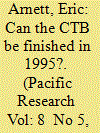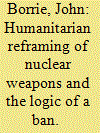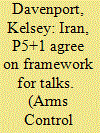| Srl | Item |
| 1 |
ID:
009230


|
|
|
|
|
| Publication |
May 1995.
|
| Description |
24-27
|
|
|
|
|
|
|
|
|
|
|
|
|
|
|
|
| 2 |
ID:
131442


|
|
|
|
|
| Publication |
2014.
|
| Summary/Abstract |
The achievement of past international treaties prohibiting anti-personnel mines and cluster munitions showed that unpropitious political situations for dealing with the effects of problematic weapons could be transformed into concrete, legally binding actions through humanitarian-inspired initiatives. Although there is now renewed concern about the humanitarian consequences of nuclear weapons, some policy makers dispute the relevance of these past processes. This article examines how and why cluster munitions became widely reframed as unacceptable weapons, and the nature and significance of functional similarities with contemporary efforts of civil society activists to instigate humanitarian reframing of nuclear weapons and promote the logic of a ban treaty in view of its norm-setting value among states. In the case of cluster munitions, the weapon in question was signified as unacceptable in moral and humanitarian law terms because of its pattern of harm to civilians with reference to demonstrable evidence of the consequences of use. Ideational reframing was instigated by civil society actors, and introduced doubts into the minds of some policy-makers about weapons they had previously considered as unproblematic. This is relevant to the current discourse on managing and eliminating nuclear weapons in the Nuclear Non-Proliferation Treaty, in which there is dissonance between the rhetoric of those states claiming to be responsible humanitarian powers and their continued dependence on nuclear weapons despite questions about the utility or acceptability of these arms.
|
|
|
|
|
|
|
|
|
|
|
|
|
|
|
|
| 3 |
ID:
129108


|
|
|
|
|
| Publication |
2014.
|
| Summary/Abstract |
After three days of talks in Vienna, Iran and six world powers agreed last month on a framework and timetable to guide the first four months of negotiations on a comprehensive deal on Iran's nuclear program. EU foreign policy chief Catherine Ashton, who leads the negotiating team for the six-country group known as the P5+1 (China, France, Germany, Russia, the United Kingdom, and the United States), said in a Feb. 20 statement that the parties had "identified all of the issues" to be addressed in the comprehensive agreement. An official who was briefed on the talks told Arms Control Today in a Feb. 20 e-mail that this is not a "written agenda" but an "understanding of the issues that must be covered." The official, who is from a P5+1 country, said that most of the discussions were on process but that "some substance was covered." The Feb. 18-20 meetings marked the resumption of political-level negotiations between Iran and the P5+1, following a Nov. 24 agreement on a plan of action, which laid out initial steps for each side to take and the broad parameters to guide negotiations on the comprehensive deal. (See ACT, December 2013.)
|
|
|
|
|
|
|
|
|
|
|
|
|
|
|
|
| 4 |
ID:
150322


|
|
|
|
|
| Summary/Abstract |
It has been two decades since the nuclear Comprehensive Test Ban Treaty (CTBT) was opened for signature at the United Nations. So far, 183 states have signed and 166 have ratified the treaty, which U.S. President Bill Clinton called “the longest-sought, hardest-fought prize in the history of arms control.”
|
|
|
|
|
|
|
|
|
|
|
|
|
|
|
|
| 5 |
ID:
101867


|
|
|
|
|
| Publication |
2010.
|
| Summary/Abstract |
On April 5, U.S. President Barack Obama declared the entry into force of the Comprehensive Test Ban Treaty (CTBT) as one of the highest priorities of the nuclear disarmament policy. On April 15, B. Obama -for the second time since 1999 - urged Congress to ratify the document.
On September 16, the U.S. State Department announced the resumption of American participation in the Conference on Facilitating the Entry into Force of the CTBT. U.S. experts started talking about the high probability of Congress ratifying the treaty.
|
|
|
|
|
|
|
|
|
|
|
|
|
|
|
|
| 6 |
ID:
009640


|
|
|
|
|
| Publication |
Jan/Feb 1995.
|
| Description |
44-45
|
|
|
|
|
|
|
|
|
|
|
|
|
|
|
|
| 7 |
ID:
009639


|
|
|
|
|
| Publication |
Jan/Feb 1996.
|
| Description |
41-44
|
|
|
|
|
|
|
|
|
|
|
|
|
|
|
|
| 8 |
ID:
014788


|
|
|
|
|
| Publication |
July-Sept 1992.
|
| Description |
293-300
|
|
|
|
|
|
|
|
|
|
|
|
|
|
|
|
| 9 |
ID:
017267


|
|
|
|
|
| Publication |
May 1994.
|
| Description |
703-707
|
|
|
|
|
|
|
|
|
|
|
|
|
|
|
|